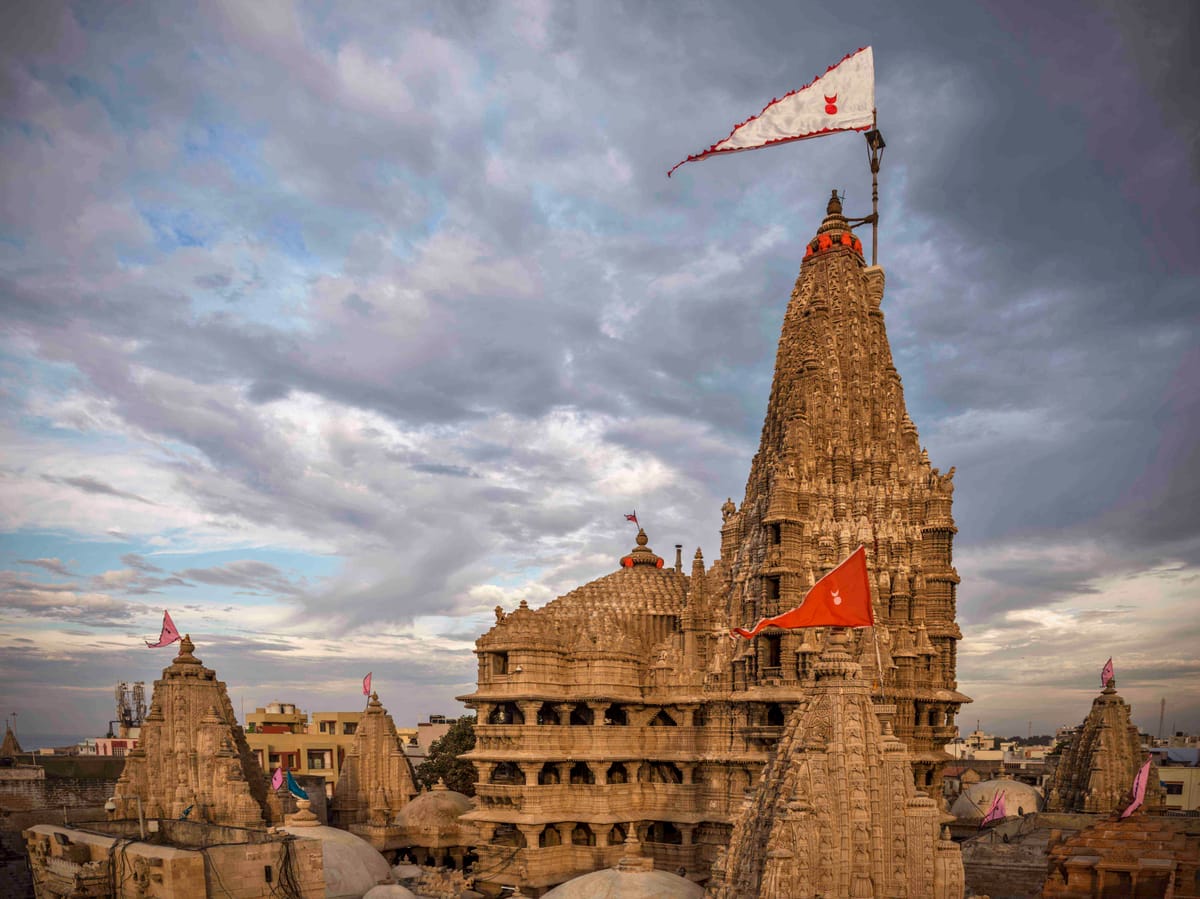Dwarka Temple: The Sacred Abode of Lord Krishna

Dwarka Temple, situated on the western coast of Gujarat, India, is one of the most revered pilgrimage sites for Hindus worldwide. Also known as Dwarkadhish Temple, it stands as a symbol of devotion and faith, drawing millions of devotees each year to seek the blessings of Lord Krishna, the supreme deity of the Hindu pantheon.
Historical and Mythological Significance
Dwarka holds immense historical and mythological significance in Hinduism. According to ancient texts like the Mahabharata and the Vishnu Purana, Dwarka is believed to be the capital city of Lord Krishna's kingdom during the Dwapara Yuga, a period in Hindu cosmology. The city is said to have been submerged underwater after Lord Krishna's departure from the mortal world.
The present-day Dwarka Temple is believed to have been built by Vajranabh, the great-grandson of Lord Krishna, over the submerged ruins of the ancient city. It is considered one of the Chardham (four principal pilgrimage sites) in Hinduism, along with Badrinath, Puri, and Rameswaram.
Architectural Splendor
The architecture of Dwarka Temple is a magnificent blend of Hindu and Rajput styles, reflecting the rich cultural heritage of Gujarat. The temple's main spire, adorned with intricate carvings and sculptures, rises majestically above the cityscape, symbolizing the divine presence of Lord Krishna.
The sanctum sanctorum houses the main deity, Lord Dwarkadhish, standing in all his resplendent glory. The idol is crafted from black marble and is adorned with jewels and garments, exuding an aura of divine grace and serenity.
Religious Practices and Festivities
Dwarka Temple is a hub of religious activities and festivities throughout the year. Daily rituals include the Mangla Aarti (morning prayer), Shringar Aarti (mid-day prayer), and Sandhya Aarti (evening prayer), where devotees gather to offer their prayers and seek the blessings of Lord Krishna.
One of the most significant festivals celebrated at Dwarka Temple is Janmashtami, the birthday of Lord Krishna. The temple witnesses a grand celebration with elaborate decorations, devotional singing, and a procession of the deity. Thousands of devotees throng to the temple to participate in the festivities and pay homage to the divine infant.
Spiritual Significance
Dwarka Temple holds immense spiritual significance for devotees of Lord Krishna. It is believed that a pilgrimage to Dwarka and the darshan (sight) of Lord Dwarkadhish can grant liberation (moksha) and fulfill the desires of the devotees. The temple is also associated with the concept of dharma (righteousness) and the eternal principles taught by Lord Krishna in the Bhagavad Gita.
Legacy and Influence
The influence of Dwarka Temple extends far beyond the boundaries of Gujarat. It is a spiritual epicenter that attracts devotees from all over India and abroad. The teachings and blessings of Lord Krishna, as imparted at this sacred site, have a profound impact on the lives of those who visit.
Dwarka Temple also plays a crucial role in promoting tourism and cultural heritage in Gujarat. The temple complex, along with its surroundings, offers a glimpse into the rich history and traditions of the region, attracting scholars, historians, and tourists alike.
Conclusion
Dwarka Temple stands as a testament to the devotion and reverence for Lord Krishna. Its architectural grandeur, religious significance, and spiritual ambiance make it a unique and revered destination for devotees and seekers alike. Whether you are on a spiritual quest, seeking divine blessings, or simply looking to experience the profound tranquility of a sacred site, Dwarka Temple offers a haven of peace, spiritual enlightenment, and a deep connection with the divine.



